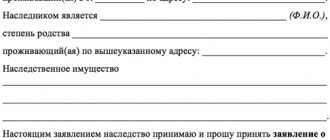In a situation where there is no will and you have not declared rights to the inheritance, after six months you can lose it forever. This rule, however, has its exceptions. For example, a direct heir can assume inheritance rights automatically. Just conscientiously use the property of the deceased and take care of it - for example, pay bills for the apartment, make repairs to it. If no other heirs appear, the property passes to you. But it’s safer and calmer to make everything official.
Queue for inheritance
There is a waiting list for inheritance, which depends on blood ties with the deceased. Closest relatives come first and second cousins last. If the legal heir of any line dies before his parents or his own children, then the property passes to one of them. This is called the right of representation. Here is a list of those who can claim the inheritance and in what order:
- Natural and officially adopted children, widower/widow;
- Close relatives of the deceased - brothers and sisters, parents.
- Third generation of the family.
- Fourth generation of the family.
- Great-grandparents, great-nephews.
- Second cousins, great aunts, uncles and great-grandchildren.
- Unofficially adopted children, stepparents.
Dependents who lived in the care of the deceased for more than a year and are unable to care for themselves are included in a separate category. They also have the right to a share, but only half of what they would receive if they were in the official queue for inheritance.
Grounds for issue
The most obvious factor is the direct indication of the heir’s full name in the testamentary document and his personal statement of approval of the inheritance. However, it is worth considering the standards for issuing a document also for the legal distribution of inheritance (in order of priority). In addition, such a basis as compliance with the time period allowed for this procedure is also important.
Upon assuming the rights of an heir by law
The reason in this case is the relationship of the alleged successor with the deceased person. Since there are many queues according to the law, children, parents and spouses are in the first line, and the most distant relatives are in the last. At the same time, one should not forget about the mandatory share (Article 1149) of the Civil Code or the preemptive right (Article 1168 of the Civil Code) of some extraordinary or privileged persons.
To accept property under a will
In this situation, it is possible to issue a separate document to each person or a single document for everyone. Since the deceased citizen indicated the desired heirs in the will, they can only confirm their identities when contacting a notary and the death of the donor. Interested persons who are entitled to a mandatory share in the inheritance (unaccounted dependents of the testator) can intervene in this process.
When a notary issues a certificate of ownership
It is possible to issue such a document after the end of the waiting period, which usually lasts 6 months, but varies up or down for various reasons. The countdown begins from the moment of death of the testator. When the time resource has been exhausted and the circle of those interested has been determined, they are given the document under discussion: separately or for several people at once.
What should be in the applicant's application
The declarative nature in the course of hereditary events arises much earlier than the moment when a person actually receives a document confirming the rights to property. First, he must declare his acceptance or refusal of the inheritance. Moreover, the first, as a rule, is accompanied by a related request for the production of a certificate.
Contents of the application to the notary on the topic of inheritance:
- A header indicating to whom and from whom the application is being submitted.
- Title of the document.
- The text of the document containing information about the persons involved, the inheritance and the consent to accept it. It also describes the request for a certificate.
Consent to appropriate the inheritance is recorded at the same phase, and the implementation of the expressed desire to obtain a certificate is postponed until the permitted stage. Such a statement will be kept in safe custody by a notary. The document complies with standard semantic and office work parameters.
Documents for receiving inheritance
The list of papers may vary for each specific case and depends on both the type of property and the type of relationship. General list of documents:
- death certificate;
- evidence of relationship (for a widow or widower this could be a marriage certificate, for a son or daughter a birth certificate);
- identification;
- proof that the inherited property was acquired after marriage (for a widow/widower);
- an extract from the house register about the deceased;
- inheritance documents.
Place and repayment of debts upon entry into inheritance according to the law
To clarify where to accept property, you need to study Article 115 of the Civil Code of the Russian Federation. Such a place could be:
- the place where the testator most recently lived;
- the address where the inherited property is located;
- the area where the most valuable part is located (if the values are distributed in more than one place).
If you are registering an inheritance through a notary, he can involve a manager to protect the property and ensure its preservation until the property passes to the heirs. Then the heir must repay the expenses spent to preserve the property. When all conditions are met, the citizen will officially be able to join.
You can get legal assistance on inheritance issues on our website.
How to calculate inheritance tax without a will
The very concept of inheritance tax has not existed for more than 10 years, but a state duty has appeared, which you must pay at the notary’s office. It includes notary services. The amount depends on the value of the property and the degree of relationship and can sometimes be quite high.
- heirs of the first stage, as well as parents, brothers and sisters give 0.3 percent, the maximum amount does not exceed 100 thousand rubles;
- other family members pay 0.6 percent, the maximum amount does not exceed 1 million rubles.
Cost of the procedure
Prices for notary services depend on their list. In some aspects, a single tariff is triggered if notarial procedures are subject to state tax. Otherwise, prices depend on the level of the notary’s office and the location of the inheritance case (in Moscow the rates are higher than in other regions).
What notary services are paid?
When drawing up a will and opening an inheritance case, a notary carries out consulting work, procedures for registration and certification of documents. A notary's income for one inheritance case increases in parallel with the increase in the number of persons involved, since they often want to have individual receptions and other procedures.
In addition, the inheritance case sometimes involves additional requests from the notary as part of interdepartmental cooperation, for which payments are made. The most enterprising notaries require a separate fee for their efforts in making requests and for presenting the information received.
Benefits when paying duties
Having found out what and how the notary issues to citizens after entering into an inheritance, it is worth paying attention to benefits. The issuance of a certificate of inheritance has a fixed, uniform rate throughout the country. Specific citizens receive discounts or exemptions from fees in accordance with Article 333.38 of the Tax Code of Russia.
Categories of beneficiaries when receiving a title document of inheritance from a notary:
- those who lived before the death of the testator in the property owned by him and continue to live there;
- receiving bank deposits and funds in accounts, money for insurance, the salary of the deceased, copyrights and dividends for them;
- minors and disabled dependents.
In general, when covering the costs of a notary, benefits are also provided to authorities, disabled people from non-working groups, individuals when certifying wills to the state or regional treasury of subjects, public organizations of disabled people (and for all the functions of a notary).
If the deadline for registering an inheritance has expired
If you did not manage to enter into an inheritance within six months, you will have to go to court. The only way to resolve the matter without litigation is to obtain written consent from all other heirs who have already accepted the inheritance to recognize your right. This happens very rarely. In order to restore your rights through the court, you need to prove that you missed the deadline for a good reason. For example:
- were abroad for some reason and could not return;
- were seriously ill and were unable to move;
- were in prison or colony without the opportunity to contact a notary;
- did not know about the relative/inheritance;
- did not know about the death of a relative.
There is no exact list; situations can be very different, but these are the most common reasons. Evidence of a valid absence can include, for example:
- medical certificates;
- documents from work, if we are talking about a long business trip.
The documents depend on the situation and the reason for the absence. After considering your case, the court makes a decision either to refuse due to insufficiently valid reasons/lack of evidence, or grants the request and restores the term, or allows you to enter into the inheritance immediately.
- Lawyers for inheritance issues
Features of inheritance in the event of the death of a former spouse
This question often arises among former spouses who want to inherit. As for legislation, a clear circle of persons who have the right to inherit is determined. Children belong to this category. Their status will not change if the marriage between the parents is dissolved. In this case, the child can inherit part of the mother’s property. To do this, the birth certificate must indicate that she is his mother.
Chapter 63 of the Civil Code of the Russian Federation lists the rights of heirs. Thus, the legal spouse inherits the property of the spouse in the event of a legal marriage. There is no mention of any right of inheritance that the former spouse may have. This is justified, since from the moment of divorce the spouses become former relatives. And this leads to the fact that the ex-husband no longer belongs to the category of heirs.
Some experts believe that the ex-husband can be included in the 8th line of heirs. But practically this is of little use. It is believed that undivided property in a divorce proceeding goes to the ex-husband after the death of his wife. But in practice this is not the case. The issue is often resolved in court. If the ex-wife did not leave a will in favor of her ex-husband, the heirs have the right to it according to the order of priority.
It is necessary to file a claim in court to return your own share in the common property. Along with it, you must provide documentary evidence of your right to common property. If the decision is positive, this part of the property will be excluded from the main inheritance. If such was the will of the deceased, the former spouse can inherit her part of the property on completely legal grounds.
When inheriting under a will, the principle of freedom applies. This means that the testator has the right to choose an heir at his own discretion. As a result, only those indicated in the document will claim this part of the property. The rest automatically lose the right to inherit this part. If there is no will, the ex-husband can inherit a certain part of the property only if certain conditions are met:
- When he himself is disabled;
- If there are no heirs who are ready to accept the inheritance.







